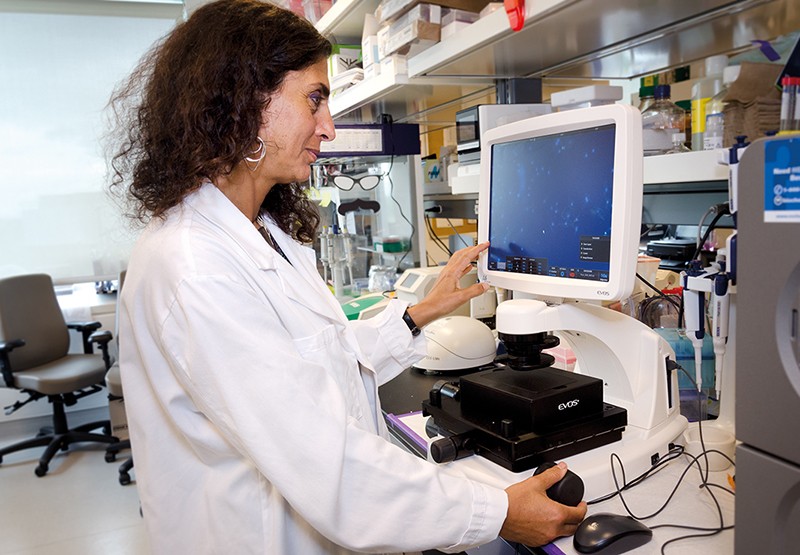Finding prenatal brain cells trapped in time
Dr. Jabado doesn’t beat around the bush. “I treat patients who have these tumors,” she says. “And they are often lethal.”
To defeat an enemy that appears seemingly out of nowhere in young healthy bodies, Dr. Jabado and her lab at the Research Institute of the McGill University Health Center must learn everything they can about its origin. They are testing the hypothesis that these brain tumors are developmental glitches at the prenatal stage. The cells remain stuck at a point in the brain’s development and become cancerous years later. The goal is then to know what drives these tumors, how best to treat them, and to understand their relationship to normal brain development.
Understanding them, however, requires a lot of information. Cells in the embryo go through many changes, and finding the exact stage of development that matches a tumor takes some digging. That is why Dr. Jabado’s team of molecular biologists, biochemists, and geneticists have sequenced countless human brain cells and patient tumor cells. They retrace tumor lineages, build models based on mice and fruit flies, and look at everything in the geneticist’s handbook, from exomes, transcriptomes, genomes, single cells, and RNA. “Anything you can imagine to study the genome and [all that controls the genome], we do it,” says the pediatric hemato-oncologist.
This is where CCF resources come into play. They offer a place to keep data where they can be analysed and shared in such a way that they benefit the greatest number of people. “Without this infrastructure, we’d have no way to store and make sense of the data,” explains Dr. Jabado.

Nada Jabado, hémato-oncologue pédiatre à l’Institut de recherche du Centre universitaire de santé McGill
In collaboration with Dr. Claudria Kleinaman, assistant professor of human genetics at McGill University and principal investigator at the Lady Davis Institute for Medical Research at the Jewish General Hospital, and Dr. Michael Taylor, paediatric neurosurgeon and senior scientist at The Hospital for Sick Children in Toronto, this work has allowed her team to discover mutations in genes that no-one had imagined. These mutations are in fact a new mechanism for oncogenesis—the complex process by which normal cells become cancerous.
“We are now building the Rosetta Stone that will allow us to see what this mechanism is doing to tumorous cells.” The mechanism also seems to appear in processes beyond the brain, meaning the benefits from this research could reach farther than a few specific types of brain cancer in children and young adults. “We have also discovered […] a classification of brain tumors that is much more precise,” adds the McGill professor. These discoveries will allow targeted therapies that can be given much more frequently and in a way to have the most impact. “So it can work for everyone and not just for one in ten cases, if that.”
With cancers and some degenerative diseases, the study of genomics is essential in finding flaws and vulnerabilities, how they came to be, and how to prevent or treat them. It helps researchers like Dr. Jabado to discover these diseases as they appear and treat them before they become a problem.
According to Dr. Jabado, platforms like the national ARC platform, which allow researchers across the country and the world to share data and the methods to analyse them, are the foundation of all genomics. “Each datum adds a piece of the puzzle,” she says.
“It’s a jewel.”


